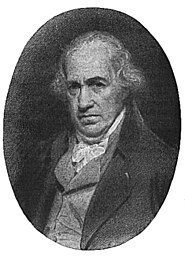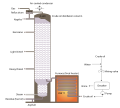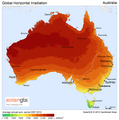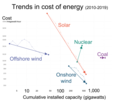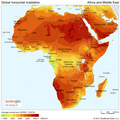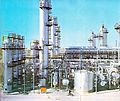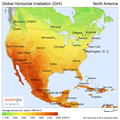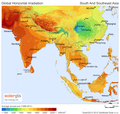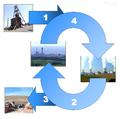Portal:Energy
| Main page | New articles & Tasks |
 The Energy Portal Welcome to Wikipedia's Energy portal, your gateway to energy. This portal is aimed at giving you access to all energy related topics in all of its forms.
|
Page contents: Selected article • Selected image • Selected biography • Did you know? • General images • Quotations • Related portals • Wikiprojects • Major topics • Categories • Help • Associated Wikimedia |
Introduction
Energy (from Ancient Greek ἐνέργεια (enérgeia) 'activity') is the quantitative property that is transferred to a body or to a physical system, recognizable in the performance of work and in the form of heat and light. Energy is a conserved quantity—the law of conservation of energy states that energy can be converted in form, but not created or destroyed. The unit of measurement for energy in the International System of Units (SI) is the joule (J).
Forms of energy include the kinetic energy of a moving object, the potential energy stored by an object (for instance due to its position in a field), the elastic energy stored in a solid object, chemical energy associated with chemical reactions, the radiant energy carried by electromagnetic radiation, the internal energy contained within a thermodynamic system, and rest energy associated with an object's rest mass. These are not mutually exclusive.
All living organisms constantly take in and release energy. The Earth's climate and ecosystems processes are driven primarily by radiant energy from the sun. The energy industry provides the energy required for human civilization to function, which it obtains from energy resources such as fossil fuels, nuclear fuel, and renewable energy. (Full article...)
Selected article
Iceland's location on the Mid-Atlantic Ridge makes it one of the most tectonically active places in the world, with over 200 volcanoes and over 20 high-temperature steam fields. Geothermal energy for heating was first used in 1907 when a farmer piped steam from a hot spring into his house. In 1930, the first pipeline was constructed in Reykjavík, heating two schools, 60 homes, and the main hospital. In 1943, the first geothermal district heating company started. Geothermal power now heats 89% of the nation's houses, provides around 19% of electricity generation and over 54% of primary energy. The first hydroelectric plant was built in 1904 and produced 9 kW of power. Hydropower now provides 81% of Iceland's electricity supply.
Imported oil provides most of Iceland's remaining energy. Replacing this with hydrogen was first suggested after the 1970s energy crisis, but the idea was not adopted until 1998. Iceland's small size makes it ideal for testing the viability of hydrogen as a fuel source for the future, while the plentiful renewable energy sources can be harnessed for its production. Iceland participates in international hydrogen fuel research and development programs, and many countries are following the nation's progress.
As a result of its transition to renewable energy, Iceland is ranked 53rd in the list of countries by carbon dioxide emissions per capita in 2003, emitting 62% less than the United States despite using more primary energy per capita.
Selected image

Photo credit: Senior Airman Joshua Strang, United States Air Force
An aurora, caused by the release of energy as charged particles collide with atoms in the Earth's upper atmosphere.
Did you know?
- Samuel Andrews (1836–1904) was an English-born chemist and inventor whose request for investment capital to build an oil refinery in 1862 led to a partnership with John D. Rockefeller and the formation of the Standard Oil companies?
- Golar Spirit (pictured) is the world's first floating storage and regasification vessel converted from a LNG carrier?
- The Rockies Express Pipeline, currently under construction, will be one of the largest natural gas pipelines ever built in North America?
- Syncrude Canada Ltd. is the world's largest producer of synthetic crude oil from oil sands?
- During World War II, Australia produced almost 500,000 barrels of shale oil by operating the Nevada–Texas–Utah type of oil-shale retorts?
- The Sangtuda 1 Hydroelectric Power Plant is expected to provide up to 12% of the total energy output of Tajikistan?
Selected biography
In recognition of Watt's achievements, the SI unit of power, the watt, is named after him.
James Watt was born on 19th of January, 1736 in Greenock, a seaport on the Firth of Clyde. His father was a shipwright, shipowner and contractor, while his mother, Agnes Muirhead, came from a distinguished family and was well-educated. Both were Presbyterians and strong Covenanters. Watt attended school irregularly and instead was mostly schooled at home by his mother.
After studying instrument-making for a year in London, the University of Glasgow offered him the opportunity to set up a small workshop within the university. It was established in 1757. After four years, Watt began to experiment with steam, finally producing a working model steam engine in 1765. Strapped for resources to develop a full-scale engine, Watt was forced to take up employment as a surveyor for eight years. Finally, in 1776, the first engines were installed and working in commercial enterprises.
After further improvements, Watt and foundry owner Matthew Boulton established Boulton and Watt in 1794 to exclusively manufacture steam engines. By 1824 it had produced 1,164 steam engines having a total nominal horsepower of about 26,000.
In the news
- 6 January 2025 – Syrian civil war
- The International Committee of the Red Cross announces plans to expand its operations in Syria beyond an initial US$100 million program, citing urgent needs in the health, water, and power sectors. (Reuters)
- 28 December 2024 – Moldova-Russia relations
- Russian company Gazprom announces the supply of gas to Moldova will cease on January 1, 2025, alleging fails to fulfill its payment obligations. The Moldovan Prime Minister, Dorin Recean, accuses the Russian Government of deliberately weaponising energy flows to destabilise the country. (Euronews).
- 28 December 2024 – Lukoil oil transit dispute, Ukrainian energy crisis, Slovakia–Ukraine relations
- Slovakia threatens reciprocal measures against Ukraine's plans to suspend the transit of Russian oil to Slovakia on January 1, including suspending electricity supplies. In response, Ukrainian President Volodymyr Zelenskyy accuses Slovakia of opening a "second energy front" against Kyiv under Moscow's orders. (Al Jazeera)
- 25 December 2024 – Russian invasion of Ukraine
- Russian strikes against Ukrainian infrastructure, Ukrainian energy crisis
- A series of Russian ballistic missile and drone strikes target critical energy infrastructure in cities across in Ukraine, killing at least two people, injuring 20 others, and causing widespread emergency blackouts. Ukrainian President Volodymyr Zelenskyy condemns Russian President Vladimir Putin for the "inhumane" attacks on Ukrainian infrastructure. (The Kyiv Independent) (The Guardian) (RTÉ)
General images
Quotations
- "Without radical international measures to reduce carbon emissions within the next 10 to 15 years, there is compelling evidence to suggest we might lose the chance to control temperature rises. Failure to act will make an increase of between 2 and 5 degrees [3.6 - 9°F] in average temperatures almost inevitable." – Tony Blair, 2006
- "The question is not whether climate change is happening or not, but whether, in the face of this emergency, we ourselves can change fast enough." – Kofi Annan, 2006
- "I promise you a day will come when our children and grandchildren will look back and they will ask one of two questions. Either they will ask, 'What in God's name were they doing? Didn't they see the evidence?' Or, they may look back and say 'How did they find the uncommon moral courage to rise above politics and redeem the promise of American democracy?'" – Al Gore, 2007, on global warming.
Related portals
WikiProjects
WikiProjects connected with energy:
Other WikiProjects that may be of interest:
Major topics
Major categories
National energy supply, use & conservation
National electricity sector
Politics, economics, environment
- Climate change
- Energy conservation
- Energy economics
- Energy crises
- Energy development
- Energy policy
- Peak oil
Energy sources
- Fuels
- Biofuels
- Fossil fuels
- Fusion power
- Nuclear technology
- Renewable energy
- Energy conversion
- Electric power
- Energy storage
Energy-related design
Scientific usage
Help

Puzzled by energy?
Can't answer your question?
Don't understand the answer?
- Ask at the reference desk
- Read the Wikipedia help pages
For further ideas, to leave a comment, or to learn how you can help improve and update this portal, see the talk page.
Associated Wikimedia
The following Wikimedia Foundation sister projects provide more on this subject:
-
Commons
Free media repository -
Wikibooks
Free textbooks and manuals -
Wikidata
Free knowledge base -
Wikinews
Free-content news -
Wikiquote
Collection of quotations -
Wikisource
Free-content library -
Wikiversity
Free learning tools -
Wiktionary
Dictionary and thesaurus



